Wednesday, December 19, 2012
My Top Ten holiday eating tips are true year after year, an annual post to remind us all—myself included—that healthy holiday eating is possible. (Hint: does not include total denial.) Have a joyous and healthy holiday season!
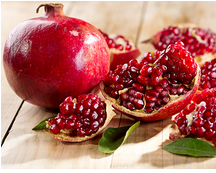 I’ve been procrastinating posting this piece for a while now. I began working on it around Thanksgiving, believe it or not, at the beginning of the holiday hullaballoo. However, the simple fact is that I generally prefer writing about food and using that as a backdrop to bring in the science and health pieces naturally. Furthermore, there are so many people writing “do this!” and “don’t do that!”during the holiday season. I am reluctant to add to the din, and the whole subject feels like a bit of a drag. After all, food is at the heart of our best loved holiday traditions and culture, whether baking cookies, mixing holiday cocktails, or making eggnog. As a card-carrying foodie, I would never encourage you to deny these most simple and beautiful of life’s pleasures; I’m no nutrition grinch.
I’ve been procrastinating posting this piece for a while now. I began working on it around Thanksgiving, believe it or not, at the beginning of the holiday hullaballoo. However, the simple fact is that I generally prefer writing about food and using that as a backdrop to bring in the science and health pieces naturally. Furthermore, there are so many people writing “do this!” and “don’t do that!”during the holiday season. I am reluctant to add to the din, and the whole subject feels like a bit of a drag. After all, food is at the heart of our best loved holiday traditions and culture, whether baking cookies, mixing holiday cocktails, or making eggnog. As a card-carrying foodie, I would never encourage you to deny these most simple and beautiful of life’s pleasures; I’m no nutrition grinch.
Nevertheless, I do have thoughts on such matters, as you can well imagine, and many people do in fact gain weight during the holiday season. Thus, I would be remiss if I didn’t, er, weigh in on these issues, given my goal is to help you eat your way towards better health with science-based strategies, as well as recipes. I hope today’s Top Ten Tips in No Particular Order includes some helpful hints and/or reminders for you to consider as we move through the final weeks of the year.
Healthy Holiday Eating: Top 10 Tips
 1. Monitor your weight. Weight gain occurs incrementally, and detecting small changes are best observed numerically. Monitoring your weight and overall body composition by calculating your body mass index is as important as measuring other physiological parameters such as blood pressure and blood lipids; all of these impact your risk of chronic disease. Weight gain around the waist is especially harmful because of its inflammatory effect, so keeping track of how your clothes are fitting is also important. Many professionals believe that weighting yourself approximately weekly is a helpful way of maintaining a healthy weight. If you don’t own a scale, you might consider asking for one as a gift, or buy this present for yourself.
1. Monitor your weight. Weight gain occurs incrementally, and detecting small changes are best observed numerically. Monitoring your weight and overall body composition by calculating your body mass index is as important as measuring other physiological parameters such as blood pressure and blood lipids; all of these impact your risk of chronic disease. Weight gain around the waist is especially harmful because of its inflammatory effect, so keeping track of how your clothes are fitting is also important. Many professionals believe that weighting yourself approximately weekly is a helpful way of maintaining a healthy weight. If you don’t own a scale, you might consider asking for one as a gift, or buy this present for yourself.
(Yes, speaking of this subject being a drag, I did just suggest asking Santa for a scale.)
2. Know your schedule and plan meals accordingly. We all know what to expect when attending holiday parties: food, and lots of it. You can’t be that different from me: I love my favorite dishes and desserts and enjoying them is an essential part of holiday celebrations. Aside from the basics on portion size (see next point below), an important strategy is to anticipate these events and eat less while also making healthier choices during the previous and subsequent meals to provide balance.
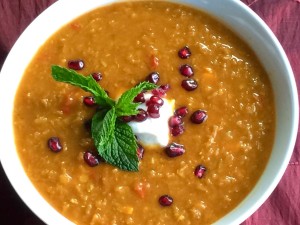 3. Smaller plates, smaller cups, smaller portions. Quite simply, using smaller plates and cups leads to less food and drink consumed. In other words, this is a way to fool ourselves into eating smaller portions. I’ll bet you don’t always have a choice in this matter lest you never be invited to another dinner party again, so if you can’t manage this one while out then more restraint on your part is required to consume smaller portions. This strategy is true whatever you’re eating lusciousmoroccan red lentil soup (pictured), but especially important when consuming energy-dense foods like cheese and desserts, and it’s one reason why I “make it mini,” like my brownie stars, triple chocolate biscotti, and butter cookies .
3. Smaller plates, smaller cups, smaller portions. Quite simply, using smaller plates and cups leads to less food and drink consumed. In other words, this is a way to fool ourselves into eating smaller portions. I’ll bet you don’t always have a choice in this matter lest you never be invited to another dinner party again, so if you can’t manage this one while out then more restraint on your part is required to consume smaller portions. This strategy is true whatever you’re eating lusciousmoroccan red lentil soup (pictured), but especially important when consuming energy-dense foods like cheese and desserts, and it’s one reason why I “make it mini,” like my brownie stars, triple chocolate biscotti, and butter cookies .
4. Chew slowly, consume mindfully. It takes some time for your brain to respond to satiety signals that tell you “Stop eating! I’m full!” We often don’t hear and/or blatantly ignore these signals, either because they are drowned out by our desires for “more” or because we are not giving our body the chance to respond. The holiday season and all its succulence is meant to be savored. Take your time and enjoy each moment, including the hedonic pleasures that eating evokes. In so doing, you’ll also consume less food and have fewer stomach aches from overconsumption.
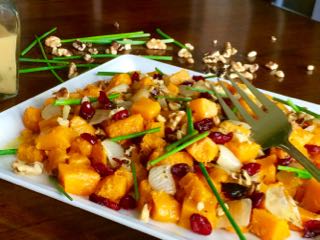 5. Eat your veggies and fruits. The holidays are filled with our favorite foods, which tend to be high in calories. However, the recommendations for half your plate to comprise vegetables and fruit remain and remembering this is important when filling your dish. The strategy may sound boring but the dishes needn’t be, and there are so many festive ways to prepare vegetables. Here’s a recipe for spinach and fennel salad with avocado and pomegranate as beautiful as it is healthful. The colorful butternut squash salad pictured here is also festive and fabulous with its dried cranberries. Or check out my food and drink page for recipes to inspire. for more spectacular plant-focused food and drink page dishes. Don’t neglect these super foods this holiday season.
5. Eat your veggies and fruits. The holidays are filled with our favorite foods, which tend to be high in calories. However, the recommendations for half your plate to comprise vegetables and fruit remain and remembering this is important when filling your dish. The strategy may sound boring but the dishes needn’t be, and there are so many festive ways to prepare vegetables. Here’s a recipe for spinach and fennel salad with avocado and pomegranate as beautiful as it is healthful. The colorful butternut squash salad pictured here is also festive and fabulous with its dried cranberries. Or check out my food and drink page for recipes to inspire. for more spectacular plant-focused food and drink page dishes. Don’t neglect these super foods this holiday season.
 6. Don’t forget to exercise. The constant barrage of messages about getting to the gym are a bit irksome, even to me. At a time when there are more stresses on our schedules than any time of year, maintaining a fitness routine is a real challenge. And, to be clear, we really should increase our activity to compensate for the extra calories we’re consuming. (Back to that energy balance scale again.) This year, I was “lucky” that the holiday season coincided with the beginning of my marathon training Some other personal tips that have worked for me include walking as a form of transportation to/from work and errands and running with my husband on the weekends. We also love to go ice skating as a family (that’s my nephew, Jackson). Figure out what works for you—and stick to it. And if stuff gets in the way, don’t beat yourself up, just resume your normal workout schedule as soon as feasible.
6. Don’t forget to exercise. The constant barrage of messages about getting to the gym are a bit irksome, even to me. At a time when there are more stresses on our schedules than any time of year, maintaining a fitness routine is a real challenge. And, to be clear, we really should increase our activity to compensate for the extra calories we’re consuming. (Back to that energy balance scale again.) This year, I was “lucky” that the holiday season coincided with the beginning of my marathon training Some other personal tips that have worked for me include walking as a form of transportation to/from work and errands and running with my husband on the weekends. We also love to go ice skating as a family (that’s my nephew, Jackson). Figure out what works for you—and stick to it. And if stuff gets in the way, don’t beat yourself up, just resume your normal workout schedule as soon as feasible.
7. Count your beverages. It’s like “count your blessings,” but not as fun. The point here is that liquid calories contribute heavily to our energy intake throughout the year, but especially around the holidays. Whether alcoholic or not, our bodies aren’t as good at recognizing calories in liquid form, so we tend to just pack them on as extra. Be aware of how much you are drinking, and take this into consideration when heading back to the bar or buffet for more.
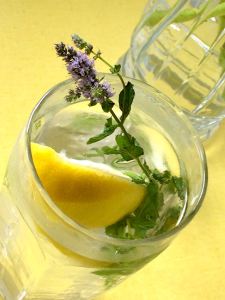 8. Drink water. We’ve all heard the advice “Drink eight glasses of water a day.” In fact, there’s not research to support that old wives’ tale. Our thirst mechanism is generally quite able to help us identify when we need to hydrate, and we obtain much of our water throughout the day by consuming water-containing beverages and foods. (Yes, coffee counts, and so does the water present in vegetables and fruits). That said, we tend to consume less water when we’re out eating and drinking, and remembering to drink water is important at these events as it will help to create additional volume in your stomach, helping you to feel fuller on fewer calories. It is also especially important to drink water if you are consuming alcohol given its dehydrating effect. Add a wedge of lemon and sprig of mint to brighten things up for the holiday, refreshing and pretty.
8. Drink water. We’ve all heard the advice “Drink eight glasses of water a day.” In fact, there’s not research to support that old wives’ tale. Our thirst mechanism is generally quite able to help us identify when we need to hydrate, and we obtain much of our water throughout the day by consuming water-containing beverages and foods. (Yes, coffee counts, and so does the water present in vegetables and fruits). That said, we tend to consume less water when we’re out eating and drinking, and remembering to drink water is important at these events as it will help to create additional volume in your stomach, helping you to feel fuller on fewer calories. It is also especially important to drink water if you are consuming alcohol given its dehydrating effect. Add a wedge of lemon and sprig of mint to brighten things up for the holiday, refreshing and pretty.
9. Beware of buffets. Buffets are a hallmark of holiday parties for plenty of logical reasons and thus unavoidable. They are also a recipe for overconsumption, especially when outfitted with large plates and a seemingly endless supply and variety of tasty food. I am including this point separate from the others simply to encourage heightened awareness of your eating behaviors and selections in buffet settings. I know there’s still food left on the table, but are you really still hungry? Perhaps it’s a better idea to seek out the dance floor.
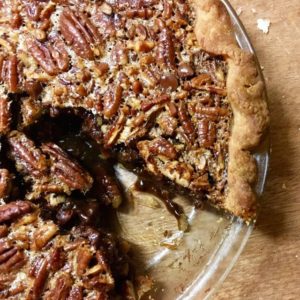 10. Employ restraint, but not complete denial. A healthy amount of dietary restraint is important—especially during the holidays. Otherwise, our insatiable appetites for good food and increased opportunities for eating and drinking dovetail with the human body’s capacity to store extra calories, ergo weight gain. On the other hand, research has also shown that denial often backfires, leading to overconsumption in the long run (and frustration in the short run). Allow yourself to eat the foods you love, with an eye towards portion size and the other tips above. (Pictured: must try chocolate bourbon pecan pie)
10. Employ restraint, but not complete denial. A healthy amount of dietary restraint is important—especially during the holidays. Otherwise, our insatiable appetites for good food and increased opportunities for eating and drinking dovetail with the human body’s capacity to store extra calories, ergo weight gain. On the other hand, research has also shown that denial often backfires, leading to overconsumption in the long run (and frustration in the short run). Allow yourself to eat the foods you love, with an eye towards portion size and the other tips above. (Pictured: must try chocolate bourbon pecan pie)
There you have it: my top ten tips in no particular order. This list is not the be all and be all, for sure, and perhaps you have a few more of your own clever strategies that work for you. My list, while not referenced in the text itself—meaning, I generally don’t include scientific citations in my blog posts—is based on scientific research studies. I’m not particularly fond of anecdotes, but if you are, I’ll also tell you that these are strategies I also employ in my personal life.
I hope they work for you too during this holiday season, and beyond.
Edited and updated 8 December 2017 with new links and pics.
—
Learn more about food personality and health expert Dr. PK Newby here, or her experience as a nutrition scientist, professor, and consultant here. Or click here if you just want to ogle food porn featuring plant-based, globally inspired cooking.

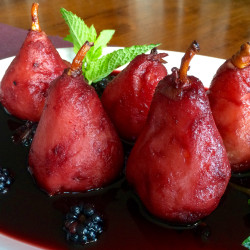

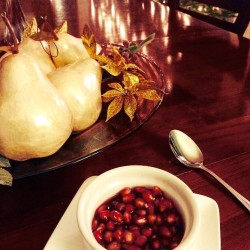

Fantastic! Thanks PK! I especially liked your point about smaller plates and counting beverages. And…I am going to ask Santa for a scale! I have never given my weight much attention because it is in the healthy range. Your posts and ideas have led me to realize that this is the time to pay attention. Best to keep the focus on maintaining a healthy weight, rather than trying to lose it! BTW, a fun way I have found to fit running in during busy holidays is to get a small backpack (like a camelbak with the water bag removed) and literally RUN errands. Bonus: you don’t have to wrestle with shoppers for parking which may save time in the long run!
My favourite one here (that I always forget) is that there are calories in drinks too–somehow I can usually fool myself into thinking that wine doesn’t count. 😉
Psych tips for avoiding holiday (and non-holiday) excesses:
http://not-a-psychiatrist.blogspot.ca/2012/12/the-pleasure-principle.html